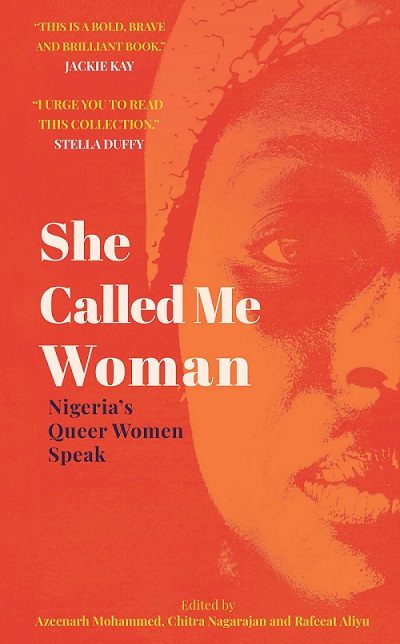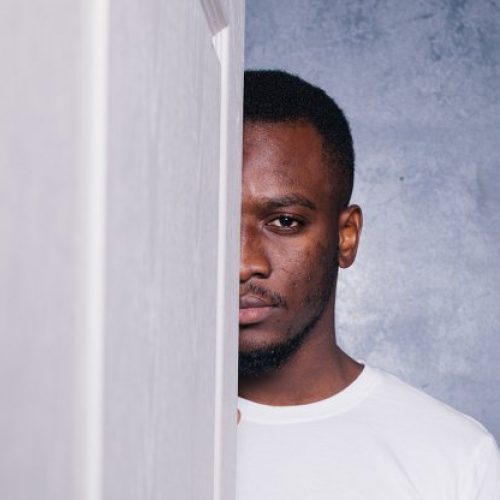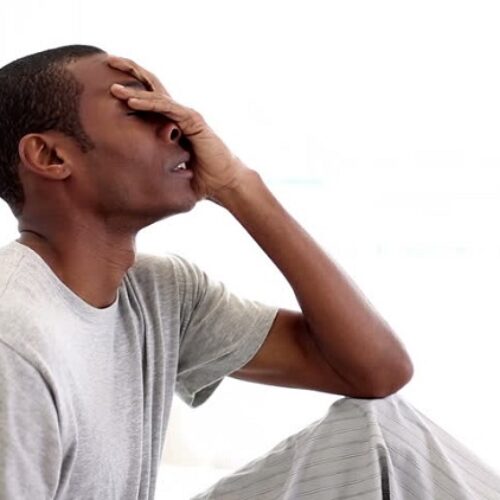A Book About Queer People Is Coming From Cassava Republic, And It’s Called “SHE CALLED ME WOMAN: NIGERIA’S QUEER WOMEN SPEAK”
‘These true stories are beautifully told, the pain and honesty and hope and joy in these accounts is strong like a song.’ – Stella Duffy
Cassava Republic Press is proud to reveal the cover for She Called Me Woman: Nigeria’s Queer Women Speak, a ground-breaking collection of 25 first-hand narratives from a cross section of queer Nigerian Women, which will be published on April 24th 2018. The book challenges stereotypes about the reality of being lesbian, bisexual and trans (woman) in Nigeria.
Edited by Azeenarh Mohammed, Chitra Nagarajan, and Rafeeat Aliyu, these narratives give the reader access to the narrators’ innermost thoughts and explore what it means to be a queer woman within Nigeria’s often deeply conservative communities.
Through their words, we learn of first loves, heartbreaks and familial pressure; the struggle to reconcile religion, sexuality and culture; the battle to be comfortable with one’s gender and sexual identity within communities that can be hostile and intolerant; the socioeconomic pressures and universal difficulties faced by women in Nigeria.
She Called Me Woman restores agency, presence and humanity to Nigeria’s queer women by providing a platform from which they speak for themselves. Women from a wide range of class, religion and educational backgrounds take the reader on a sometimes celebratory, sometimes troubled but always insightful journey into their everyday life. The book covers the experience of queer women from across Nigeria, with narrators coming from Maiduguri, Zamfara, Imo, Oyo, Abuja, Plateau, Lagos, Ondo and more. It restores balance in the discussion on sexuality and gender, which can unfairly favour queer men. It brings into mainstream consciousness the existence and issues of queer women in Nigerian society, ensuring that their stories are told and their voices heard.
According to editor, Rafeeat Aliyu, “This book is important to me because as someone who looks for clues on women’s sexuality in Nigeria’s history, I am often frustrated by the way scholars have painted a heteronormative picture. When we become history, no one will be able to say, ‘there’s no proof of homosexuality in Nigeria’ because of the existence of this book and others like it.”
Designed by Maia Faddoul, the cover image features a faded-out picture of a Nigerian woman, gazing straight at the reader as if calling on them to look at her and acknowledge her existence. The use of varied colours on the cover calls attention to the diversity of voices and narratives in the collection. The subtitle is purple – a key colour in queer communities that has variously been used to represent lesbian pride, the spirit of the LGBTQ community, and a challenging of gender norms in its blend of blue and pink. The editors, Mohammed, Nagarajan, and Aliyu, have collected stories that challenge us to rethink the meaning of queerness and womanness and this cover embodies it.
About author
You might also like
“YES, MOM, I’M GAY.” The Truth That Was A Long Time Coming
“My son, are you a gay?” That was the question I both expected and didn’t see coming from my Mother. In the recent past, whenever people asked me the question:
A Case For Our Mental Health
It has been a tough year for the world, and in recent times, an even tougher few weeks for LGBTQ Nigerians. Amidst the continuous spread of COVID-19 and fight for
A WORD FROM THE ADMIN
I know that Freedom Of Expression is a very valuable and catchpenny commodity in modern society, something the press and media hold dear and social media trolls revel in. And










1 Comment
User
March 14, 12:35Ah ah, this is serious oh!